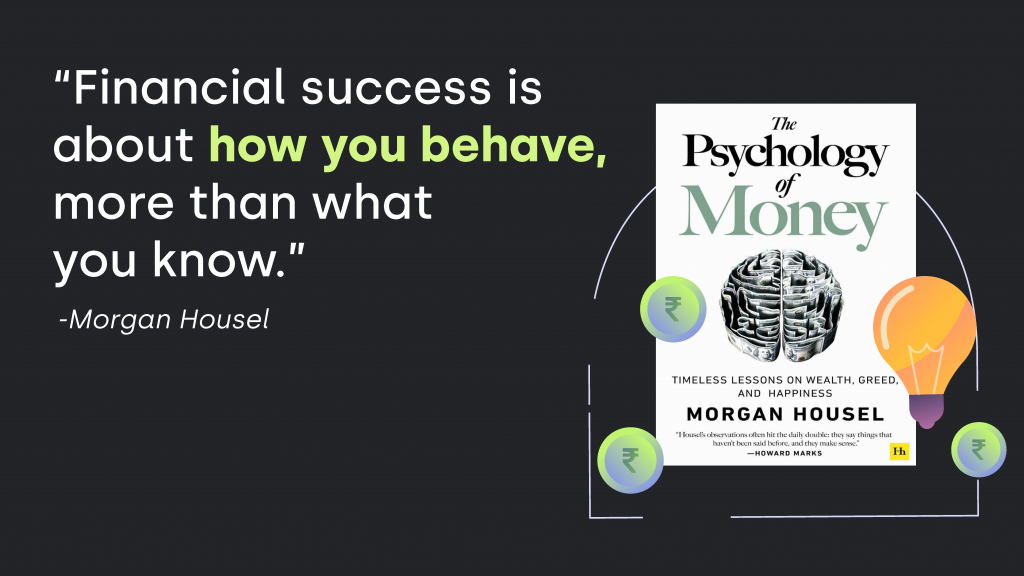Starting your financial journey? You HAVE to read this book!
Do you want to be rich or wealthy? Is money management a science or an art? Are financial outcomes driven solely by intellect? Or does luck also have a role to play?
As you start earning, learning and growing, there are often too many questions and very few sources of answers – for the simple reason that your relationship with money will never be the same as mine, and mine will never resonate with the next person’s. We all have different questions, and different reasons to be asking those questions.
This is why I find ‘The Psychology Of Money’ by Morgan Housel to be a super insightful book for people of all ages, wages and backgrounds. It doesn’t attempt to provide answers, but rather a perspective.
In an illuminating introduction, the author urges readers to question what financial success means to them, and how they might define it. Housel himself describes it like this –
“Financial success is not a hard science. It’s a soft skill, where how you behave is more important than what you know. I call this soft skill the psychology of money.”
The book informs the reader that while they may have been taught to look at financial prowess as a subject with rules and laws, it is in fact an art that is often governed by a nuanced understanding of the ups and downs in the financial sector (and the umpteen factors that influence it!).
The concept is simple – no two people are exposed to the same family, circumstance, education, or even luck – so why then do we work on the assumption that their financial journeys and gains will be the same? These differentiating factors have a huge role to play in developing peoples’ relationship with money – and subsequently with saving and investing as well.

An important aspect of the psychology of money is that ‘being wealthy’ might mean different things to different people and it affects what they do with their money and how. He puts it like this, for instance – would you consider yourself a millionaire if you had a million rupees stowed away in a bank account to which you didn’t have access? Not likely.
So being a millionaire in your mind means being able to spend a million rupees. But, if you spend a million rupees, you’re back to square one and aren’t really a millionaire anymore, are you? So are you wealthy when you can be noisy about it? Or are you wealthy when your money is silently working for you?
The author raises a number of questions like this throughout the book – and they’re questions each one of us should know the answers to in our own mind to create a fruitful relationship with money.
This book is a great read for literally anyone who wants to understand money a bit better, but I wanted to share my 3 favorite chapters from the book which are a must-read for young investors today. Here are my picks –
1. Chapter 4: Confounding Compounding – Through the experiences of Warren Buffet (who started investing at just 10 years old), Housel manages to encapsulate the benefits of investing early and tapping into the benefits of compounding.
In this anecdotal chapter, Housel presents the idea that investments that are made in the hopes of quick and high returns are volatile and unpredictable. Instead, investing regularly and staying invested for a long time is the key to unlocking the full potential of compound interest.
2. Chapter 5: Getting Wealthy vs. Staying Wealthy – It is impossible to make only good decisions when it comes to investing, but it is not impossible to take precautions to avoid investment mistakes. Housel encapsulated financial success in one simple word – survival.
Housel states that while earning money is what requires you to take risks, keeping money comes from a place of financial prudence and caution. The author takes the readers back to Warren Buffet’s success – the kind of success that comes from staying out of debt (or at least only borrowing within your means).
3. Chapter 10: Save Money – There is no wealth without savings. Irrespective of what your income might be – if you have an income at all, you have the capacity to save, and consequently the capacity to invest and build your wealth.
The author implores readers to understand that saving money is the one thing that ultimately gives you flexibility in life – the flexibility to change careers, take time off, or achieve any goals that might require you to step away from work for a while.
And who doesn’t want that kind of flexibility? Savings allow you to take charge of your own life and decisions, mitigating circumstantial obstacles.
These are just the chapters I found most relevant, especially for younger investors. But believe me, when I say, this book is a treasure trove of solid and time-tested advice.
Whether you’re an avid reader or not – this book is an easy and breezy read. You can pick it up at any time, read any random chapter, and walk away from it with a little more information than you had before. Even veteran investors can still acquire some fresh perspectives through Housel’s words, and newbie investors will find this to be a read that’s chock full of useful, relevant insights.
